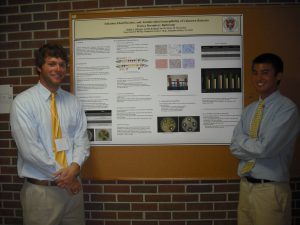On April 17, 2010 three senior biology majors working on independent research projects with Dr. Kristian Hargadon presented posters of their work at the Virginia Collegiate Honors Council Conference held at Virginia Wesleyan College.
Curtis Read and Justin Odanga have spent their spring semester exploring microbial biodiversity, isolating and identifying 6 species of bacteria from the environment and assessing the antimicrobial resistance/suscueptibility of these organisms. Building off of skills learned in the lab portion of H-SC’s Microbiology course, Curtis and Justin employed a variety of diagnostic techniques to identify these species, including Gram stains, endospore stains, carbohydrate fermentation tests, nitrate reduction tests, catalase tests, motility tests, and several other biochemical tests. Among the species identified were Staphylococcus aureus, Enterococcus malodoratus, Enterobacter agglomerans, and Bacillus polymyxa. In what will undoubtedly become deparmental legend, this latter organism (B. polymyxa), which is very common, shares many diagnostic properties with Bacillus anthracis, the causative agent of anthrax. While their professor was indeed thrilled that this pathogen was not isolated on campus, the prospect definitely provided moments of excitement for Curtis and Justin, who were much more enthusiastic about potentially having found this organism! Despite having their chances for instant fame ruined by their subsequent identification of a much less “exciting” organism, their results were indeed quite provocative and demonstrated striking patterns of bacterial resistance to the anibiotic penicillin. Such findings do have significant implications regarding potential pathogenecity of these organisms, and future work may illuminate whether these organisms are also resistant to common antimicrobials used to control environmental microbes. Curtis and Justin showed extreme dedication and enthusiasm throughout their project and received numerous compliments about their work at the VCHC conference.
Chad Harte, who received a cash prize for the Best Poster Award at the conference, presented his research on a particular cell type of the immune system known as the dendritic cell. These cells play critical roles in immunity. As immature cells, they provide immediate protection against invading pathogens; upon maturation, they drive subsequent, more specific cells of the immune system to effectively respond to and eliminate the invaders. Because dendritic cells are found in relatively low numbers in model organisms, these cells are difficult to study under experimental conditions. Therefore, Chad’s work focused on characterizing an immature dendritic cell line known as JAWSII. In particular, Chad evaluated the resonsiveness of these cells to the maturation stimuli lipopolysaccharide and lipteichoic acid. He monitored dendritic cell responsiveness to these stimuli using the reverse transcription-polymerase chain reaction technique to evaluate the expression of genes associated with dendritic cell maturation. In exciting results, Chad demonstrated that exposure of the JAWSII cell line to maturation stimuli does upregulate the expression of certain genes encoding proteins essential to subsequent stimulation of immune responses. These findings suggest that this cell line can be used as an effective model for the study of dendritic cells, and this work will serve as a “springboard” for subsequent work in Dr. Hargadon’s lab that aims to evaluate the influence that tumor cells have on dendritic maturation and activation.


